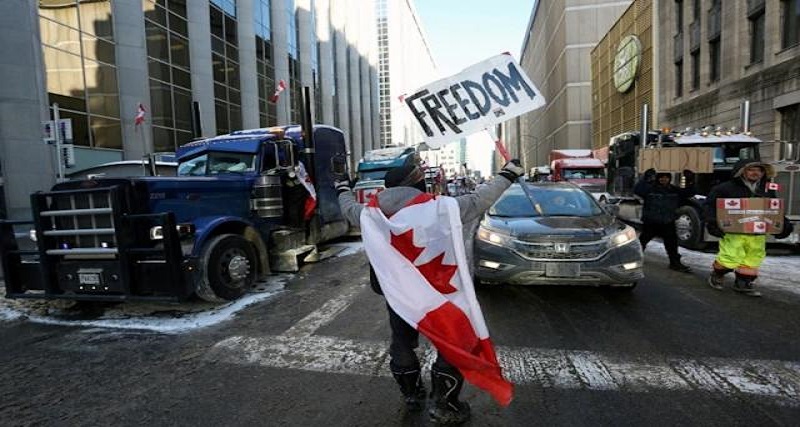
Canada’s capital remained paralyzed by trucks on Tuesday, despite several provinces declaring it is time to lift restrictions considered among the toughest in the world. While authorities struggle to control protests, Saskatchewan, in the country’s west, said Tuesday it was ready to lift all pandemic restrictions. Quebec and Alberta also said they would start easing measures. In Ottawa, Trudeau – who a day earlier had said protests ‘had to stop’ – appeared to change gears, saying he understood ‘how frustrated everyone is’ and that ‘the time is coming when we will be able to relax’.
‘We’re all sick and tired of restrictions, mandates, and sacrifices,’ Trudeau said, adding, however, that vaccine mandates were one way to avoid further restrictions. The so-called ‘Freedom Convoy’ began in January in western Canada – began in protest at requirements that truckers be properly vaccinated, or tested and isolated, when crossing the US-Canada border.
Rallies of solidarity
As the protest grew into the occupation of the Canadian capital, it prompted rallies in Canada and abroad, and by Tuesday, it had temporarily closed a crucial US border crossing that is the busiest international land-border crossing in North America.
In a state of emergency in Ottawa, federal police have deployed amid demonstrators carrying Canadian flags and anti-Trudeau placards in protests now in their second week and fast becoming a rallying cry for anti-vaccine groups. Briefing reporters on Tuesday, Ottawa Deputy Police Chief Steve Bell said his agents had arrested 22 people to date.
Under light snowfall, truckers have been building open fires and playing street hockey. Since a court-ordered their incessant honking to cease, some of the truckers have turned to revving their engines to keep warm. Police say some of the truckers brought their children, making evacuations more difficult – especially as some have removed their tires and others have modified their brakes to immobilize their trucks.
Vaccine requirements
In Canada, more than 80% of children and adolescents aged 5 and older are fully vaccinated against Covid-19. ‘We’re all fed up,’ said Francois Legault, premier of Quebec province, which announced it would lift most Covid-19 restrictions by mid-March as hospitalizations have dropped. Saskatchewan and Alberta announced the easing of many Covid-19 restrictions in the coming weeks, including requiring proof of vaccination status for businesses and public venues.
Originally aimed at opposing vaccine requirements, the trucker movement has now become a broader protest against Covid-19-related restrictions and Trudeau’s Liberal government, and it has put the spotlight on pandemic curbs around the world. On Tuesday, US and Canadian business groups urged protesters to end their blockade of the Ambassador Bridge, connecting Ontario province and Michigan state. In a joint statement, the government said it would not tolerate any group undermining the cross-border trade helping families on both sides of the border.
Another key trade link between the United States and Canada has also been blocked by protesters for several days. The Canadian Transportation Minister Omar Alghabra warned a prolonged blockade ‘will have serious implications on our economy, on our supply chain’. Inspired by the protests in Canada, a convoy of trucks and campervans blocked streets near New Zealand’s parliament in Wellington on Tuesday to protest against Covid-19 measures, while calls have multiplied on social media for similar marches across Europe and the United States.
Vaccinated Canadians generally sympathize with the truckers’ ‘concerns and frustrations,’ according to a Leger poll conducted among vaccinated Canadians. There are some people in Ottawa who do not hold that view. ‘In a democracy, everyone has the right to express themselves,’ said Cedric Boyer, 48, a Frenchman living in the capital.

Post Your Comments